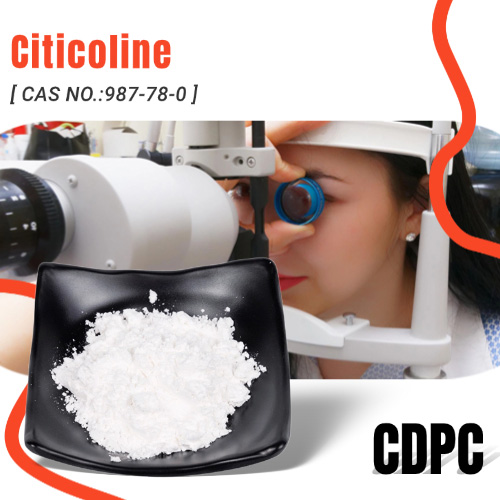Citicoline is widely used in clinical practice, mainly used in the treatment of cerebrovascular diseases, cognitive disorders, brain injury, brain atrophy, chronic cerebral insufficiency and other central nervous system diseases, which can effectively promote brain cell metabolism, promote brain circulation, and protect brain function.
However, we must pay attention to the dosage and method during use, and it not recommended to take it for a long time.
What is citicoline?
The essence of citicoline is an activator of energy metabolism of central nervous cells, which can effectively promote brain cell metabolism and improve brain function. It often used in clinical treatment of central system diseases such as cerebral infarction, cerebral atrophy and Old Man dementia. Clinical studies have shown that it can effectively protect brain cells and promote the recovery of nervous system.
What diseases does citicoline mainly treat clinically?
Cerebral infarction:
Citicoline can used to treat acute cerebral infarction as well as convalescent cerebral infarction.
In the acute stage, citicoline injection, combined with basic treatment such as anticoagulation and thrombolysis, can effectively improve the microcirculation of brain tissue, improve the energy metabolism of brain cells, and promote the recovery of injured nerve cells while protecting the structure and function of brain cells.
In the remission phase, oral citicoline usually used clinically to narrow the cerebral infarction through long-term administration, protect the brain function, promote the recovery of limb function, and improve the prognosis of cerebral infarction patients.
Central nerve injury caused by craniocerebral trauma:
Craniocerebral injury refers to head tissue injury caused by violence on the head, mainly including skull fracture and brain injury, and citicoline one of the commonly used drugs in clinical treatment of craniocerebral injury.
Clinical studies have shown that the injection of citicoline can effectively protect neuronal cells and myelin sheath in patients with craniocerebral trauma, improve brain circulation, reduce the damage to brain tissue caused by the defect hypoxia caused by trauma, and reduce the probability of brain swelling, brain hernia and other dangerous symptoms.
Brain atrophy:
Cerebral atrophy is a kind of central nervous system degeneration frequently occurring in the older people, and it is a inducing factor for many diseases such as stroke and Old Man dementia.
Citicoline is one of the commonly used drugs for clinical brain atrophy. Clinical studies have shown that citicoline can effectively improve the metabolic level of brain cells, promote the blood supply to the brain, protect the structural and functional integrity of neurons, effectively delay brain atrophy, and improve headache, dizziness, memory loss and other symptoms.
Chronic cerebral blood insufficiency:
Chronic cerebral blood insufficiency is one of the common diseases of the older people. It usually manifested as headache, dizziness, etc., and even syncope in severe cases, which seriously threatens the health of the older people. Citicoline is one of the drugs for chronic cerebral blood insufficiency.
Clinical studies have shown that citicoline can improve the blood supply to the brain, especially promote the microcirculation of brain tissue, and promote the metabolic level of brain cells, protect brain function, and relieve headaches, dizziness and other symptoms.
Is citicoline recommended for long-term use?
The recovery of cerebral infarction is often a long-term process, and the function of the central nervous system has recovered almost after 6 months. It not recommended for patients with cerebral infarction to take citicoline for a long time, mainly for the acute phase and the recovery period, generally in 3-6 months.
Long-term oral administration of citicoline is also likely to cause adverse reactions, because citicoline is inherently a drug that promotes brain excitement, and long-term use is easy to cause limb tremor and increase muscle tension, which is not conducive to the rehabilitation of limb function in patients with cerebral infarction, and is also prone to insomnia, limb numbness, and extracorporeal reactions. It not recommended that patients with cerebral infarction take citicoline for a long time.
What do you need to pay attention to when taking citicoline scientifically?
Note the dosage form and usage
There are two types of citicoline injection and oral administration, among which the injection mainly used in the acute stage of cerebral infarction or craniocerebral trauma, and the dose mostly 250-500mg each time.
Oral agents mostly used in the remission or chronic phase of central system diseases, and the conventional administration method is 200mg each time, 3 times a day.
Be aware of adverse drug reactions
The most common adverse reactions of citicoline gastrointestinal reactions, such as dry mouth, loss of appetite, diarrhea, abdominal pain, nausea, etc., but most can tolerated.
A small number of patients will have allergic reactions, rash, pruritus, etc., such patients recommended to stop the drug;
A very small number of patients will have abnormal liver and kidney function during medication, and liver enzymes, creatinine and other indicators will increase abnormally. Therefore, caution is recommended for patients with abnormal liver and kidney function.
A very small number of patients during the drug will appear limb numbness, tremor, insomnia and other central nervous system adverse reactions, it recommended that patients with such reactions temporarily stop the drug.
At the same time, citicoline has a certain irritation to the gastrointestinal tract, so it recommended to take after meals to reduce adverse reactions.
Pay attention to the use of special groups
Pregnant women, breastfeeding women prohibited, lack of relevant research data, safety unknown; Children prohibited, lack of relevant research data; The older people should adjust the dose, maintain the dose as low as possible, and adjust the drug dose according to clinical needs; Use with caution in patients with sleep disorders, which is easy to aggravate insomnia.
Pay attention to reactions between medications
Citicoline is not suitable for use with chloral, such as chloral hydrate, which is easy to aggravate the functional inhibition of the central nervous system.




